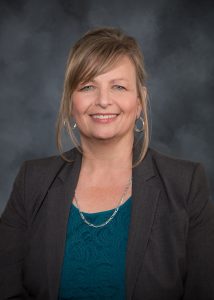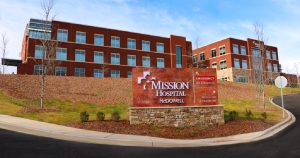
Carol Wolfenbarger
By Carol Wolfenbarger, MSN, RN, FACHE
Patient safety is at the core of everything we do at Mission Hospital McDowell (MHM). In recognition of World Patient Safety Day (September 17), this month we’re highlighting the many layers of safety-oriented protocol and systems in place that exist here at MHM to create a safety and solution-focused culture of continued learning.
Broadly, patient safety encompasses countless patient care safeguards that are woven into all of our processes, including infection prevention, facility safety, team member safety and more. Ensuring our patients’ safety means wearing personal protective equipment (PPE) according to infection prevention guidelines while within the hospital and caring for patients, properly evaluating each patient’s level of illness, continuously focusing on provider-to-patient communication and holding periodic hospital-wide and department-level safety drills. Because safety is our priority, short morning meetings called “Safety Huddles,” are held by leadership, where management and staff debrief on patient care and any possible safety concerns for the day.
Megan Mise is MHM’s Quality and Safety Manager and Equity Compliance Coordinator, and she has an extensive background in risk management. She sums up the hospital’s patient safety philosophy nicely: “Our goal is to create a culture of safety in our organization where staff are empowered and accountable regarding concerns they see or have around patient safety. Our hospital’s leaders encourage them to share their concerns in order to ensure that corrections and accommodations are made.” She notes that they’ve worked hard as an organization to allow all staff to feel comfortable with identifying process failures. This isn’t just when a mistake of some sort happens. It may be observing the potential for one, or a “near miss,” as well as maintaining an environment where, first and foremost, learning is valued.
“An example of a near miss,” says Mise, “would be a freshly washed floor without ‘wet floor’ warning signs posted (protocol) and a staff member identifying and correcting to prevent a fall from happening due to the slippery floor. Our frontline staff are always on the lookout and point out potential safety situations openly. This provides us the opportunity to be proactive and correct the situation. We call this a ‘Great Catch’ and recognize the team member for their contribution to preventing safety issues.”
The more staff share concerns, the safer the hospital becomes, Mise explains, and the daily safety huddles across MHM departments are perfect examples of this. “When we just consider our own experience as we work in isolation at times, we don’t realize we might not be the only ones facing a challenge. Our safety huddles give staff the opportunity to show that there’s great value anytime an individual voices a problem or concern because, chances are, they aren’t the only one experiencing it, and that it’s an issue that’s likely to impact many,” she shares.
Mise highlights the fact that the huddles are also times when, as each day at MHM begins, caregivers and leaders can focus on important things like whether they have all the equipment and supplies they anticipate needing throughout their shift and to consider whether they have other resources and support they need for patient care. “As part of HCA Healthcare, we have had amazing support for ensuring that we have the supplies and equipment we need for patient care,” Mise adds.
When variation occurs to process our outcomes, Mise relates that a Root Cause Analysis session will be carried out. “These meetings bring together key stakeholders who would be involved in a safety situation, to examine ways we can learn from the event and improve the care we provide in the future,” she says. “Driven by a host of data regarding outcomes and trends in care, we review monthly, quarterly and annually to determine and identify opportunities to improve and advance excellence.”
MHM’s caregivers are the most conscientious and dedicated imaginable, but they are also human beings. That’s why, Mise explains, MHM has such robust systems in place to evaluate risk and prevent harm to our patients. “By focusing on close analysis and improvement,” declares Mise, “we’re able to put together and learn from all the pieces that play into patient care, risk and safety.” She also emphasizes that mitigating risk in these ways is both an institution-wide and systemwide effort, which is critical for consistency in care.
When you walk into MHM, whether you’re a patient, family member or caregiver, our aim is to ensure your safety in every possible way through anticipatory prevention strategies and adaptive, solution-oriented approaches to problem solving and risk management and reduction. Caring for the healthcare needs of our community in the safest environment possible is the reason we exist, and I celebrate the team who carries out these safety-focused activities daily.
In closing, I want to remind you to stay safe. COVID-19 continues to be present, and it is important that we continue to practice social distancing, wearing a mask and washing our hands.

Carol Wolfenbarger, MSN, RN, FACHE, is Chief Executive Officer of Mission Hospital McDowell.
